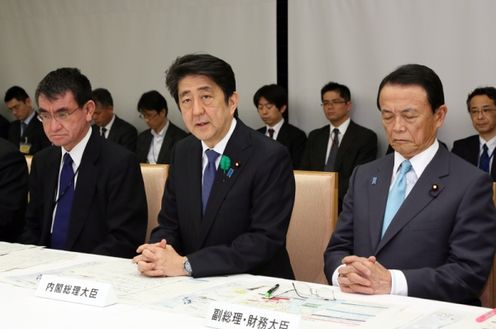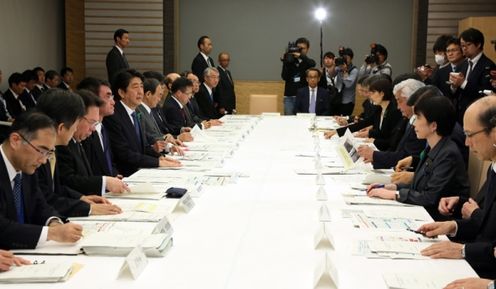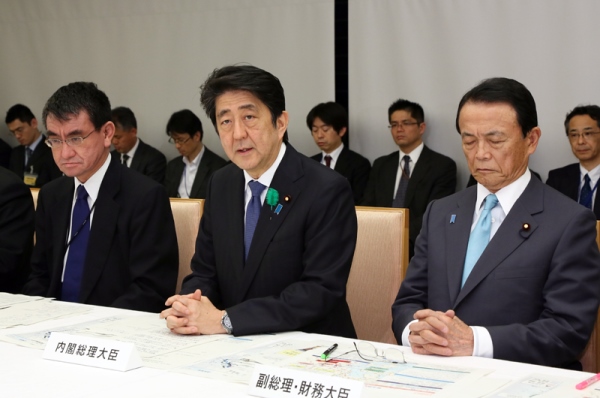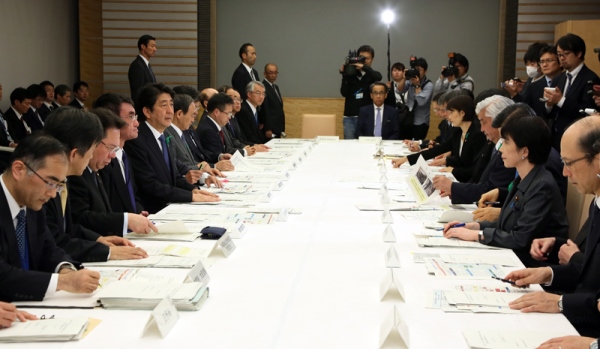Home > News > The Prime Minister in Action > April 2016 > Eighth Meeting of the Emergency Response Headquarters for the Earthquake Centered in the Kumamoto Region of Kumamoto Prefecture 2016
The Prime Minister in Action
Eighth Meeting of the Emergency Response Headquarters for the Earthquake Centered in the Kumamoto Region of Kumamoto Prefecture 2016
April 17, 2016

Photograph of the Prime Minister delivering a speech (1)

Photograph of the Prime Minister delivering a speech (2)
[Provisional Translation]
Prime Minister Shinzo Abe held the eighth meeting of the Emergency Response Headquarters for the Earthquake Centered in the Kumamoto Region of Kumamoto Prefecture 2016 at the Prime Minister’s Office.
At the meeting, reports and discussions were held on the situation pertaining to damages and the response of each ministry and agency.
The Prime Minister said in his opening address,
“Today is the third day since the earthquake. In the affected area, 30,000 members of the Self-Defense Forces (SDF), police, fire departments, and medical units are now working to meet the expectations of those affected by the disaster. They are doing grueling work around the clock, but there are still those known to be in the region who we have not yet been able to contact.
I want everyone to continue to exert all efforts for rescue and relief activities while paying careful mind to secondary damage.
Over 100,000 people are now living anxiously in evacuation centers. Due to the breakdown of infrastructure and other reasons, there are also those forced to live precariously, including those who are in their own homes.
People have been placed in physically and mentally harsh conditions, including having no choice but to wait in line for hours under the hot sun for emergency meals or water. We must improve their situations as soon as possible.
A moment ago, I established the Team to Support the Daily Lives of Disaster Victims.
The team will secure necessities such as water, food, and disposable diapers, while paying sufficient mind to those who need our consideration, such as the elderly and infants. We must swiftly advance work to secure toilets, provide medical care and medicinal products, and also repair lifestyle infrastructure like water service and electricity.
For those who have lost their home or for those where there is the possibility that they may lose their home, it is possible to imagine that they may need to evacuate for a long period of time. For that reason, I want everyone to accelerate initiatives to secure housing and lodging facilities and to make it possible to move out of evacuation centers at an early date.
There is also a need to move forward with efforts to rebuild the lives of those affected by the disaster, as well as the repair and reconstruction of the affected region. The situation in the region changes from one minute to the next. I want everyone to accurately grasp and swiftly respond to the needs in the disaster area.
In order to advance an agile response, I believe that the Government must take all possible steps, including the early designation of this as a ‘Disaster of Extreme Severity,’ a boost in the provision of ordinary grant tax funds, and the injection of needed emergency funds.
In any event, please keep your complete attention on the frontlines.
Our responses will be too late if we respond after people ask for help. We cannot be passive.
I want the Government to actively and quickly grasp the situation at the frontlines, and act as a single entity to take the initiative and advance responses.
To that end, we will place national public employees from the Team to Support the Daily Lives of Disaster Victims in frontline areas. I want everyone to hurry forward with preparations so that we can quickly dispatch these public employees to the affected municipalities that are working hard to respond to the disaster on the frontlines.
The Government will pursue its work with thorough sympathy for the anxiety felt by those affected by the disaster and do everything that is possible in order to support their lives. With that resolve in mind, I want you to exert every effort for response initiatives.”


